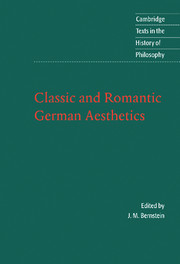Book contents
- Frontmatter
- Contents
- Introduction
- Chronology
- Further reading
- Note on the texts
- Aesthetica in nuce: A Rhapsody in Cabbalistic Prose (1762)
- Laocoön: An Essay on the Limits of Painting and Poetry (1766)
- From ‘On the Artistic Imitation of the Beautiful’ (1788)
- ‘Kallias or Concerning Beauty : Letters to Gottfried Körner’ (1793)
- ‘Oldest Programme for a System of German Idealism’ (1796)
- ‘Letter to Hegel, 26 January 1795’
- ‘Being Judgement Possibility’ (1795)
- ‘The Significance of Tragedy’ (1802)
- ‘Remarks on Oedipus’ (1803)
- From Miscellaneous Remarks (1797)
- ‘Monologue’
- ‘Dialogues’ (1798)
- ‘On Goethe’ (1798)
- ‘Studies in the Visual Arts’ (1799)
- From ‘Critical Fragments’ (1797)
- From ‘Athenaeum Fragments’ (1798)
- From ‘Ideas’ (1800)
- ‘On Goethe's Meister’ (1798)
- ‘Letter About the Novel’ (1799)
- ‘On Incomprehensibility’ (1800)
- Index
- Cambridge texts in the history of philosophy
‘On Incomprehensibility’ (1800)
Published online by Cambridge University Press: 05 June 2012
- Frontmatter
- Contents
- Introduction
- Chronology
- Further reading
- Note on the texts
- Aesthetica in nuce: A Rhapsody in Cabbalistic Prose (1762)
- Laocoön: An Essay on the Limits of Painting and Poetry (1766)
- From ‘On the Artistic Imitation of the Beautiful’ (1788)
- ‘Kallias or Concerning Beauty : Letters to Gottfried Körner’ (1793)
- ‘Oldest Programme for a System of German Idealism’ (1796)
- ‘Letter to Hegel, 26 January 1795’
- ‘Being Judgement Possibility’ (1795)
- ‘The Significance of Tragedy’ (1802)
- ‘Remarks on Oedipus’ (1803)
- From Miscellaneous Remarks (1797)
- ‘Monologue’
- ‘Dialogues’ (1798)
- ‘On Goethe’ (1798)
- ‘Studies in the Visual Arts’ (1799)
- From ‘Critical Fragments’ (1797)
- From ‘Athenaeum Fragments’ (1798)
- From ‘Ideas’ (1800)
- ‘On Goethe's Meister’ (1798)
- ‘Letter About the Novel’ (1799)
- ‘On Incomprehensibility’ (1800)
- Index
- Cambridge texts in the history of philosophy
Summary
Because of something either in them or in us, some subjects of human thought stimulate us to ever deeper thought, and the more we are stimulated and lose ourselves in these subjects, the more do they become a Single Subject, which, depending on whether we seek and find it in ourselves or outside of ourselves, we designate the Nature of Things or the Destiny of Man. Other subjects perhaps would never be able to attract our attention if we were to withdraw into holy seclusion and focus our minds exclusively on this subject of subjects, and if we did not have to be together with people and hence busy our minds with real and hypothetical human relationships which, when considered more carefully, always become more numerous and complex and thereby make us diverge into directions contrary to this single subject.
Of all things that have to do with communicating ideas, what could be more fascinating than the question of whether such communication is actually possible? And where could one find a better opportunity for carrying out a variety of experiments to test this possibility or impossibility than in either writing a journal like the Athenaeum oneself or else taking part in it as a reader?
Common sense which is so fond of navigating by the compass of etymologies – so long as they are very close by – probably did not have a difficult time in arriving at the conclusion that the basis of the incomprehensible is to be found in incomprehension.
- Type
- Chapter
- Information
- Classic and Romantic German Aesthetics , pp. 297 - 308Publisher: Cambridge University PressPrint publication year: 2002

